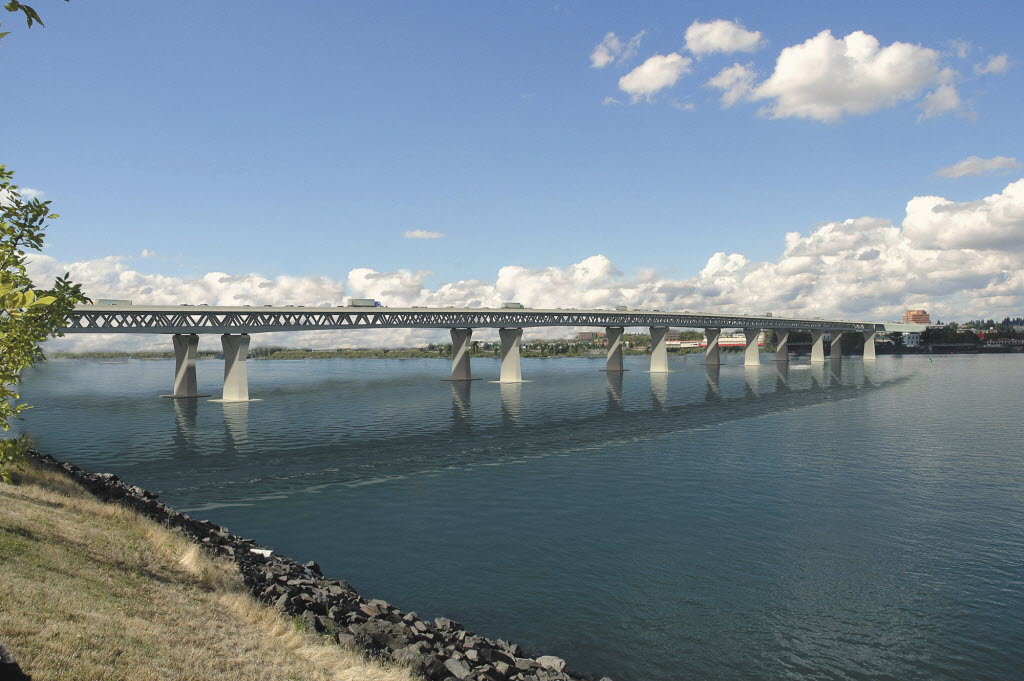The Columbia River Crossing has put a new price tag on its controversial megaproject in an estimate to federal officials, knocking the overall cost down from $3.5 billion to $2.8 billion.
The change reflects the project’s decision to build in phases, according to the most recent Federal Transit Administration summary from the CRC. But it doesn’t change the overall scope of the CRC — as long as funding comes through, said Kris Strickler, the project’s Oregon director.
“It doesn’t mean you’re taking things out of the project,” he said.
Instead, the document gives the FTA a narrower focus, Strickler said, emphasizing the components needed for light rail as part of a new Interstate 5 Bridge first. It’s light rail that the FTA could write the check to build, and project officials hope to file a formal grant application as soon as this fall.
Under the phasing strategy, the project would first replace the Interstate 5 Bridge and its approaches, and extend light rail into Vancouver. Improvements to other freeway interchanges, including the entire state Highway 500 interchange, would have to wait — if they happen at all.
CRC officials have talked about phasing in or delaying some elements of the project before, raising the possibility as early as the beginning of 2012. But the latest summary to the FTA puts a clearer number on the cost of the first phase. And it may reflect funding realities, as many Washington lawmakers aren’t sold on fully funding the CRC this year.
The summary also raises the “annual forecast year operating cost” of the project from $8.35 million to $12.81 million — an increase of more than 50 percent. Late Monday night, Strickler said he couldn’t immediately say exactly why that number changed. But it wouldn’t affect tolling on the bridge, he said.
As for the potentially deferred interchanges, those will be built as state money becomes available, Strickler said. If that happens in 2013, they’ll still be rolled out as planned in the coming years, he said. Light rail — the portion of the project the FTA is most interested in — could happen with or without the highway improvements now left out of the updated summary, Strickler said. But delaying those components could make them more costly in the long run.
What didn’t change in the updated profile of the CRC is the project’s local financial commitment rating. That stayed at “medium,” according to the FTA, despite voters last November rejecting a sales tax measure that would have covered the annual cost of operating light rail in Vancouver. C-Tran leaders haven’t decided how — or if — they’ll find another way to pay for light rail locally. The CRC has said it won’t speculate on what happens to the project if C-Tran doesn’t come through with that money.
The CRC plans to apply for an $850 million grant through the FTA’s New Starts program to construct the light-rail extension. It also lists another $850 million from a federal Transportation Infrastructure Finance and Innovation Act (TIFIA) loan, to be paid back by tolls, as a major component of the project’s finance plan.
Oregon lawmakers this year authorized $450 million as its state share of the project. The CRC is hoping Washington will do the same, though the finance plan given to the FTA only assumes $260 million in “anticipated legislative funds” from Washington. That’s the minimum amount CRC leaders have said is needed to carry the initial phase of the project forward. Planners hope to begin construction in late 2014, with light rail opening on the new bridge in 2019.
CRC spokeswoman Mandy Putney said the project is still planning on Washington contributing $450 million in state funds to the project. The state “remains committed to funding the full project” and could find the other $190 million of that separately, she said.
Recent developments in Olympia would suggest otherwise. Several leaders in the state Senate, controlled by a majority caucus of mostly Republicans, have indicated they’re not interested in funding the CRC as planned. A letter from those leaders this month called for an investigation of the CRC and its expenditures.
Earlier estimates had put the CRC’s overall cost at $3.5 billion, then $3.4 billion as both Washington and Oregon put caps on the project cost.
The FTA last updated its profile of the CRC in November 2011. The latest version, posted online by the FTA this month, reflects changes as of November 2012.




